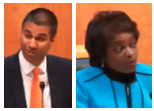FCC Chairman Ajit Pai (left) and Commissioner Mignon Clyburn during yesterday’s FCC meeting. Photos by Leslie Stimson, Inside Towers
“Maybe a long-distance call will connect and maybe it won’t,” said FCC Chairman Ajit Pai during yesterday’s meeting as he and his fellow commissioners passed a Notice of Proposed Rulemaking seeking a fix to ongoing call problems in rural America. The Commission asks for public input on rules to hold phone companies that hand off those calls to intermediate providers more accountable for ensuring those calls go through ensuring those calls go through by monitoring their performance. The changes would update the FCC’s current call completion data collection and reporting rules.
FCC Commissioner Mignon Clyburn stressed that “all of our talk about building out networks would be for naught if those services are unreliable.” While an FCC 2013 order addressed the basics, “we did not know how big the problem really was.”
Industry groups welcomed the change. NTCA–The Rural Broadband Association noted that it has been working on the problem for nearly seven years. “We have seen what can happen in a regulatory vacuum in terms of calls failing to reach rural America. It is essential therefore that the FCC neither relent nor permit backsliding in the protection of rural consumers and businesses who depend greatly on reliable connectivity to stay in touch with families, friends, customers, and suppliers,” said NTCA CEO Shirley Bloomfield.
USTelecom echoed these thoughts. “All Americans should have confidence that their phone calls will go through, regardless of the zip code they are calling,” said USTelecom CEO Jonathan Spalter. He noted complaints have dropped but the problem persists. “Ensuring calls are completed is fundamental to the FCC’s mission, and we look forward to contributing to the agency’s efforts to address this issue in an efficient way.”
July 14, 2017





Reader Interactions